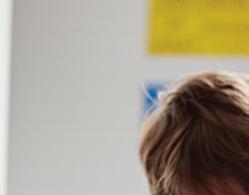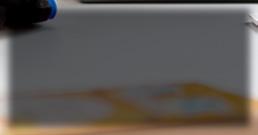
9 minute read
DIGITAL LITERACY
DIGITAL LITERACY DIGITAL LITERACY
We know how vital digital literacy We know how vital digital literacy has become, especially over the past has become, especially over the past year. Sarah Wordlaw explains why she year. Sarah Wordlaw explains why she believes Computing should be given believes Computing should be given greater attention in the curriculum. greater attention in the curriculum.
Advertisement

By Sarah Wordlaw By Sarah Wordlaw

We have an opportunity to We have an opportunity to change the face of education change the face of education forever. The pandemic has caused a forever. The pandemic has caused a seismic shift towards a more digital seismic shift towards a more digital world. Teachers, children and world. Teachers, children and families have had to ramp up their families have had to ramp up their understanding and proficiency understanding and proficiency in using technology. Not just to in using technology. Not just to support learning, but in all facets support learning, but in all facets of life: working from home, online of life: working from home, online banking and shopping. Those with banking and shopping. Those with weak understanding and poor weak understanding and poor computing skills have struggled computing skills have struggled greatly to stay afloat and this in greatly to stay afloat and this in itself has caused lots of hair-pulling itself has caused lots of hair-pulling and sleepless nights. and sleepless nights. Like many educators, I have now Like many educators, I have now also become tech support for also become tech support for families (and other staff members) families (and other staff members) and have had to brush up on a and have had to brush up on a few skills myself! But I have been few skills myself! But I have been bowled over by the development of bowled over by the development of and an embedding of skills are and an embedding of skills are school “closure” and help prepare school “closure” and help prepare skills which my school community skills which my school community both required in order to create both required in order to create children for the ever-changing children for the ever-changing have shown throughout the have shown throughout the digitally-literate children. Digital digitally-literate children. Digital world ahead of them. world ahead of them. lockdowns and I fully intend to lockdowns and I fully intend to literacy has become arguably as literacy has become arguably as continue to provide opportunities continue to provide opportunities important as traditional literacy important as traditional literacy Children grow up in an ICT-rich Children grow up in an ICT-rich for further development of for further development of during this strange time. When during this strange time. When environment: it is everywhere. environment: it is everywhere. Computing skills post-COVID. Computing skills post-COVID. schools return to whatever schools return to whatever It still amazes me how friends’ It still amazes me how friends’ “normal” may look like, I believe “normal” may look like, I believe toddlers can use an iPad toddlers can use an iPad In my experience, Primary In my experience, Primary that Computing should be made that Computing should be made proficiently. In order to become proficiently. In order to become Computing is often under-valued Computing is often under-valued a core subject, alongside Literacy, a core subject, alongside Literacy, fully-functioning adults, we must fully-functioning adults, we must as a subject. Perhaps there are not as a subject. Perhaps there are not Maths and Science. Teaching Maths and Science. Teaching provide opportunities for them provide opportunities for them adequate devices in order to teach adequate devices in order to teach Computing explicitly and discreetly Computing explicitly and discreetly to learn and develop, and that to learn and develop, and that it effectively or enough time during it effectively or enough time during through the core and foundation through the core and foundation also means that we as educators also means that we as educators the school week to do it justice. As the school week to do it justice. As curriculum, will maintain the curriculum, will maintain the need to be at the top of our game need to be at the top of our game we have found out, regular practice we have found out, regular practice important skills learned during important skills learned during with regard to digital literacy and with regard to digital literacy and




…regular practice and an …regular practice and an embedding of skills are both embedding of skills are both required in order to create required in order to create digitally-literate children digitally-literate children






Those with weak Those with weak understanding and understanding and poor computing poor computing skills have struggled skills have struggled greatly to stay afl oat greatly to stay afl oat





computational thinking. I recently computational thinking. I recently looked back at a Computing looked back at a Computing scheme of work I wrote 5 years scheme of work I wrote 5 years ago and it is totally out of date! ago and it is totally out of date! It is imperative therefore to It is imperative therefore to keep ourselves up-to-date with keep ourselves up-to-date with relevant tech: apps, games, digital relevant tech: apps, games, digital platforms, etc. platforms, etc.
Primary Computing, taught well, Primary Computing, taught well, should develop computational should develop computational thinking while covering thinking while covering information technology, computer information technology, computer science and digital literacy. science and digital literacy. Computational thinking, explained Computational thinking, explained simply, is the ability to take a simply, is the ability to take a complex problem and break it down complex problem and break it down into steps to solve it. This ability is into steps to solve it. This ability is an essential life skill! This breaking an essential life skill! This breaking down of a problem is otherwise down of a problem is otherwise known as decomposition. The next known as decomposition. The next step is pattern recognition - are step is pattern recognition - are there any similarities to other there any similarities to other problems that can be drawn from? problems that can be drawn from? After that comes abstraction, only After that comes abstraction, only focusing on the relevant information focusing on the relevant information in which to solve the problem. in which to solve the problem. Finally, the process of developing Finally, the process of developing a step-by step solution is called an a step-by step solution is called an algorithm. Algorithms are not only algorithm. Algorithms are not only seen in Computing. We teach and seen in Computing. We teach and use algorithms throughout the school use algorithms throughout the school day - think of the procedure of long day - think of the procedure of long multiplication, or baking a cake, or multiplication, or baking a cake, or planning a science experiment. planning a science experiment.
The National Curriculum for KS1 and The National Curriculum for KS1 and KS2 Computing states, ‘A high-quality KS2 Computing states, ‘A high-quality computing education equips pupils computing education equips pupils to use computational thinking and to use computational thinking and creativity to understand and change creativity to understand and change the world’. In order to deliver this the world’. In order to deliver this effectively, you can break the skills effectively, you can break the skills down into the following areas, whilst down into the following areas, whilst weaving computational thinking in all: weaving computational thinking in all:
SAFETY, RESEARCH AND COMMUNICATION
This could include: • E-safety - know the risks and how to keep safe • Acceptable and unacceptable online behaviour • Apps - what are they? How do I know which ones are safe? • Data - how is my data stored? What is privacy? • Understanding what the internet is and how it works • Using search engines effectively • Using virtual maps • Communicating and collaborating online - social media, gaming, email • Using and creating QR codes
GRAPHICS AND TEXT (information technology)
This could include learning such as: • Learning to type quickly and correctly • Creating word collages • Using Word of Google Docs effectively - changing the size/ colour/font of text • Creating digital mind maps and digital flowcharts - great for decomposition! • Photo collages
DIGITAL CREATIVITY (information technology)
This could include learning such as: • Using graphic tools to create digital drawings • Digital 3D modelling • Creating avatars and understanding the purpose • Creating and editing digital music • Creating and editing audio recordings and podcasts • Creating stop-motion animations • Editing digital photographs
MULTIMEDIA AUTHORING (information technology)
This could include learning such as: • Producing multimedia videos • Creating online activities/games for someone to play • Creating websites/Google Sites • Authoring multimedia e-books • Creating on-screen presentations (Powerpoint, Google Slides, Prezi, Emaze)
DATA AND PROGRAMMING (computer science)
This could include: • Coding • Use sequence, selection, and repetition in programs; work with variables and different forms of input and output • Creating computer programs (from Beebots in EYFS/KS1 to Scratch in KS2) • Data handling (Excel, Google Sheets, Purple Mash) • Controlling and evaluating computer simulations • Debugging Imagine a child who is proficient in all of the above skills, building upon each skill throughout the primary school years. Imagine the problemsolving ability of that child. Imagine the learning resilience of that child. Computing teaches us to find new ways. To solve problems, to seek only that which is relevant in order to move forward.


We need to be actively developing our own digital literacy and keeping abreast of changes. We must keep ahead of the game and teach children to do so too. We need children to recognise when they are using their computational thinking in every subject. We should make explicit the link to this way of thinking when problem-solving in all its forms. Let’s make links to these skills and children’s careers in the future. We have an opportunity now to maintain those skills we have been forced to develop.
Turn a negative situation into a bright and sparkling vessel for change. Let’s keep the pace up and make Computing a core subject!







